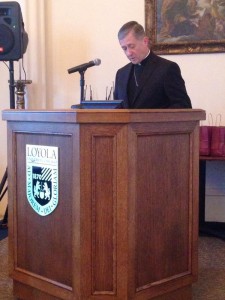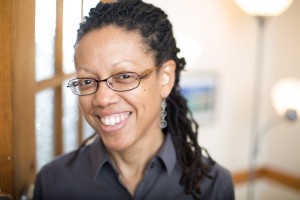Earning a dual degree at IPS, DeVona Alleyne has great advice for future students and shows that hard work pays off. Read below to find out some interesting and wonderful things about DeVona.

Nickname: None, but DeVona often gets shortened to Dee for the sake of quick conversation.
Hometown: Charlotte, N.C.
A favorite of yours: My favorite color is red, but my favorite color to wear is black – the standard East Coast uniform.
A bible verse that has significance to you?
“So we, being many, are one body in Christ, and individually members of one another.” – Romans 12:5 (NKJV)
Previous education:
University of North Carolina at Chapel Hill – B.A. in English and in Journalism in 1999
Regent University in Virginia Beach, Va. – started M.Div. in 2005
What were you doing before beginning your IPS journey?
I was a newspaper editor, most recently at the Chicago Tribune, who was laid off and considering where my passion existed outside of journalism. From my work as a hospice volunteer, I considered being a nurse and worked in a hospital for a year then went back to editing at a Christian publishing company. There, I met my mentor who steered me toward finding a program like mine at IPS.
What made you decide to come to Loyola IPS?
My manager at the Christian publishing company where I worked in 2012 would ask me about my interests from time to time that had less to do with my editing tasks. She took note of my practical theological perspectives and my care for understanding and positively shaping others’ motivations. In talking through it, she suggested I find a master’s program that combined spirituality and psychology. Thinking it was nearly impossible, I started Googling anyway and was pleasantly surprised, already living in Chicago, to find IPS’ pastoral counseling program right in my front yard!
What are your studies focused on/what degree plan are you in?
I’m in the dual degree program, pursuing the M.A. in pastoral counseling and the master of divinity. If all continues to go well, I’ll have both by May 2016 – three and a half years from when I started.
What are you most looking forward to accomplishing during your time here at Loyola IPS and how does that relate to your future goals?
I’ve learned so much in the two years I’ve been here that I couldn’t have predicted any of it. One of the things that broadened my understanding of pastoral counseling in this program is that my future career will be less about what I do and more about who I am.
That’s important for recognizing what God means to me and how, as a minister, I reflect that very practical understanding for someone else’s individual translation of their own spirituality. Through my divinity program, I hope to build upon that foundation for future chaplaincy work. Further, I look forward to being even more aware of myself in relationship to anyone I encounter — whether it’s a client in individual therapy, a group or couple – to provide the best therapeutic care leading people to their greatest capacities to love.
Do you have a favorite class or one you look forward to taking?
I thoroughly enjoyed my Social Context of Ministry course taught by Dan Rhodes, though it was perhaps the most depressing and challenging of any that I’d taken – even over Michael Bland’s psychopathology. (The latter is a close second for favorite and, ironically, depressing.) More than any other course, it framed the real world and all the intangible forces that determine public and private thought with not-so-great consequences. The challenge of the course was to rethink my worldview by deconstructing its origins and then step up to the world by considering ways to make a real difference for people.
Do you see any challenges you will have to overcome during your time here? If so, what is one of them?
The only challenge I see at IPS will be the race against time. I juggle a lot with school, church and family, and precision is necessary to get everything done. It’s gone well so far, despite a crazy schedule. I’ve taken 12 hours most semesters and just focused and prayed – prayed a lot, actually.
Do you have any recommendations for future students?
Take advantage of every experience IPS offers: Get to know and connect with classmates, have a meal on campus, talk with professors, attend events and spend time physically in the library. It’s easy to get caught up in such a studious mood that you miss out on the full experience of your studies. Debate ideas, put them into practice and question what’s happening around you. And as for the libraries, well, I’m a former journalist. There’s no reward like actually using a little shoe leather to find the information you need. All of that is a part of learning and will give you the full Loyola and IPS experience.
In what way will you go forth to “change the world?”
That’s simple: The world I encounter will change when and as I change myself and allow my experiences to change me for the better. With others, I will encourage positive transformation and expose the benefit of unexpected, undesirable or uncontrollable change.
Are you currently working on an interesting project that you wish to share?
It won’t happen until next year, but I’m tossing around a few ideas for my M.Div. project paper that will likely center on the intersection of Christianity and general understanding of human sexuality.
What is a fun fact or story about you?
I have an uncle whose name is King Solomon and an aunt whose name is Queen Esther, each on opposite sides of my family tree.
Any additional information you would like to share:
I’m a married mother of 2-year-old twins, who were 5 months old when I started attending IPS full-time. They show me every day that anything is possible.
You can connect with her via Twitter: @devonaara
Join the conversation by following @BrianSchmisek on Twitter and @LoyolaIPS on Instagram! Also, network with the Loyola Chicago IPS community on LinkedIn.




